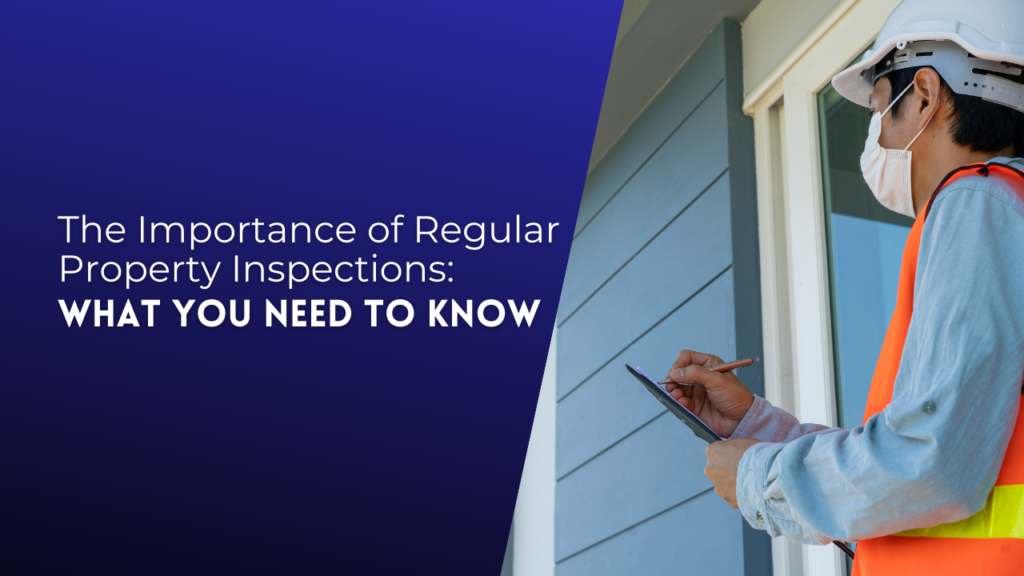Owning and managing property is a big responsibility, whether residential property or commercial property. Regular property inspection forms the very foundation of well property management because it keeps the property in good shape, tenants satisfied, and prevents long-term cost issues. This article discusses why property inspections are vital, what constitutes property inspection, and how it benefits property owners.
Why Are Inspections Important for Properties?
1. Avoiding Big Repairs
Routine inspections help discover some petty divergences before they become major problems, such as a small roof leak that can in due time lead to significant water damage and mold growth and be very expensive to repair). Finding them early saves time, chances, and needless work.
2. Guaranteeing Tenant Happiness
In rental properties, regular checks prove to tenants that you are more of an active, caring landlord. This should often decrease the rate of turnover because it is likely to cause tenants to come forward more quickly about maintenance issues. Satisfied tenants will be more likely to renew their leases.
3. Regulations
Typically some locales allow landlords the compulsion to keep the property regulated under health and safety codes. Regular inspections may ensure such compliance to be liberated from legal issues and penalties against you.
4. Keeping Property Value Safe
Observe regular inspection of property to maintain the condition of the imputed property and hence keep it in good condition for the market. Such property is generally appealing to potential buyers or tenants and will usually command higher rents or sales prices.
5. Plots Management
Such undeveloped plots or open land need to be checked regularly for trespass, illegal dumping, or thick overgrowth, thereby giving due attention to determine the value of the plots if they are supposed to be, at some point, ready for further constructions or for sale.
What Does Property Inspection Cover?
Below are some of the areas typically covered in a property inspection:
- Building Integrity: Signs of cracks, leaks, or wear and tear in walls, roof, and foundation.
- Electrical Systems: Such as electrical wiring, connection with outlets to the circuit breaker, or appliances.
- Plumbing: Signs of leaks, low or high-water pressure, or blockages in drains.
- HVAC Systems: Assessment of the heating, cooling, ventilation system functioning.
- Outside Work: Evaluate the fences, drives, farms, and paintwork.
- Safety Equipment: Smoke detectors, fire extinguishers, and other safety equipment must be present and functional.
- Plot Management: Monitor trespassing, littering, and ensure proper demarcation of boundaries.
It is essential to document the inspection with notes of the proceedings and photographs. It is thereafter a reference point for periodic maintenance and helps fight any beginnings of disputes.
Advantages of Conducting Regular Property Examination
1. Savings
Proactive maintenance is, almost invariably more cost-effective than remedial repairs. Catching fault at the early stages reduces the cost of repairing extensive damage or emergency intervention.
2. Tenant Retention
Tenants would, of course, be in the mind to keep factories over a given time, seeing that you are taking care of your property. This would save a lot in terms of costs and time associated with spending to market the property for new tenants.
3. Enhanced Security
Periodic inspections will also guarantee the safety of the premises as the risk of accidents is decreased along with its liabilities. For example, fixing loose handrails as well as faulty wiring can cause injury or fire.
4. Greater Market Appeal
An attractive property with high levels of maintenance tends to sell itself. Since it is usually well-maintained, it is much easier to market and always attracts better tenants or even buyers. Periodic Inspections are an attractive aspect for prospective clients, exhibiting before them the caring attitude towards the property.
5. Plot Preservation
Besides, undeveloped land has to be regularly checked to ensure that no unauthorized person has encroached or made illegal use of the plot. This saves the value of the property and also makes it ready for future plans.
How Often Should an Inspection Be Done?
The factors that determine how many inspections you have on the property are, for instance, the kind of property and age of the property, and local regulations. However, generally:
- Move-In and Move-Out Inspections: Those conducted at the beginning and end of a tenancy for reference as to the condition of the property.
- Quarterly or Biannual Inspections: Appropriate rentals keep problems at bay while respecting the privacy of tenants.
- Annual Inspections: Not required from active tenants, although this would have made sure an annual check ensured the completion of maintenance needs.
- Plot Inspections: Open land should be inspected after three months in order to guarantee its safety and good maintenance.
Property Inspection Tips
- Checklist for Reports: A comprehensive checklist will make sure that nothing is overlooked.
- Talk to Tenants: Let your tenants know in advance and involve them in the inspections to take their concerns seriously.
- Professional Help: When the property is big or complicated enough, call in professionals who will give a thorough unbiased assessment of the property.
- Record Keeping: Keep detailed records of all the inspections carried out including their dates, findings, and actions taken. This will help shield your back from legal disputes.
Conclusion
The regular property inspections are part of property management and bring different benefits to landlords and property owners. They ensure that the properties are still in good condition and their tenants satisfied, as well as protecting the value of the investment itself. Regular inspection helps avoid some costly repairs and makes the premises safer while keeping good relations among tenants. For plots that remain checked on a regular basis, they are kept secured as well as maintaining value. Maintenance inspections are necessary, no matter if it is one property, an entire portfolio, or just piece of undeveloped land.
